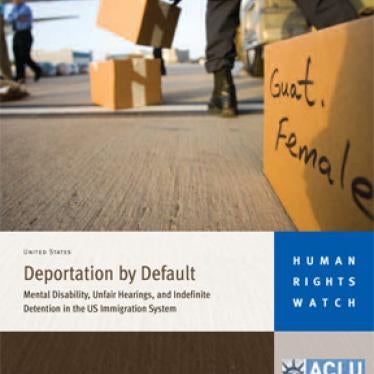July 1, 2013 - Update
On June 29, 2013, President Vladimir Putin signed into law the bill banning the promotion of information about “non-traditional” sexuality. The law entered into force the next day.
On June 27, the Parliamentary Assembly of the Council of Europe had called on the Russian authorities to drop the law noting that it was “at variance with freedom of expression and the prohibition of discrimination on account of sexual orientation and gender identity.”
Also on June 29, Putin signed a bill imposing criminal sanctions of up to three years in prison for anyone who publicly “insults the feelings of religious believers.” The law provides no clear definition of prohibited acts or speech that will be considered “insulting.”
The law is widely viewed as a response to the high-profile prosecution of the feminist punk group Pussy Riot. Three of the group’s members were convicted on criminal “hooliganism” charges after the group performed a political stunt in Moscow’s Christ the Savior Cathedral in February 2012.The new law entered into force on July 1.
“With the stroke of a pen, the authorities have endorsed debilitating restrictions on the right to freedom of expression, in the name of so-called ‘traditional values’,” said Rachel Denber, Europe and Central Asia deputy director at Human Rights Watch. “These two profoundly unjust and arbitrary laws further intensify the unprecedented crackdown on basic freedoms in post-Soviet Russia.”
_______________________
(Moscow) – The Russian parliament’s upper chamber should reject a draft law that would discriminate against lesbian, gay, bisexual, and transgender (LGBT) people, Human Rights Watch said today. The bill would make it an administrative offense to expose minors to information about “non-traditional sexuality.” The Federation Council, the Russian parliament’s upper chamber, is scheduled to debate the draft law on June 26, 2013.
Many international bodies have spoken out about the draft law, including the International Olympic Committee (IOC), the United Nations, the European Union, and the Council of Europe (CoE).
“This bill has prompted a wave of international criticism and it’s no wonder,” said Graeme Reid, LGBT Rights Program director at Human Rights Watch. “The draft is regressive and discriminatory, and represents a threat to human rights standards in Russia and internationally.”
On June 11, the lower chamber, the State Duma, hastily and unanimously passed the bill. If the Federation Council approves the bill, it will be sent to President Vladimir Putin for his signature.
An IOC spokesman in a media interview reiterated the organization’s “long commitment to non-discrimination.” The IOC has been reluctant to criticize Russia, which will host the 2014 Winter Olympic Games, for its human rights record. In a June 19 letter, Human Rights Watch called on the IOC to directly and publicly urge the Russian authorities to reject the law and prevent other forms of discrimination against LGBT people. Under the Olympic Charter, any such discrimination against a person is deemed “incompatible with belonging to the Olympic Movement.”
On June 20, Catherine Ashton, high representative of the European Union for foreign affairs and security policy, said the law “could stigmatize particular groups and individuals and lead to discriminatory practices… and is therefore in contradiction with the European Convention on Human Rights.” She also expressed concern about the “possible impact of the implementation of this law on the activities of LGBTI organizations in Russia also in the context of the ongoing pressure on civil society in the country.”
On June 11, Hakon Haugli, Council of Europe Parliamentary Assembly rapporteur on discrimination on the grounds of sexual orientation and gender identity, expressed regret that the State Duma “turned prejudice against LGBTs into law.”
A legal opinion issued on June 15 by the Venice Commission, the Council of Europe’s advisory panel on constitutional matters, concluded that draft legislation banning “propaganda for homosexuality” is “incompatible with [the European Convention on Human Rights] and international human rights standards” and should be repealed. The opinion, which covered draft legislation under consideration in Russia, Ukraine, and Moldova, found that the purpose of such laws “is not so much to advance and promote traditional values and attitudes towards family and sexuality but rather to curtail non-traditional ones by punishing their expression and promotion.”
The draft law is among many initiatives aimed at restricting Russia’s civil society and reviving the concept of “traditional values” domestically and in the international arena, Human Rights Watch said. At the UN Human Rights Council, the Russian government has introduced three resolutions aiming to “promot[e] human rights and fundamental freedoms through a better understanding of traditional values of humankind.”
“Russia has made much of its leadership on ‘traditional values’ at the United Nations, but this bill shows what ‘traditional values’ actually means in Russia,” Reid said. “This bill makes clear that in Russia, ‘traditional values’ means the state decides what is acceptable and what is not when it comes to personal identity. That is something that anyone – gay or straight – concedes at their peril.”
The bill would amend the Law on Protection of Children from Information Harmful to Their Health and Development and the Code of Administrative Violations. It would impose heavy monetary fines for promotion information about “non-traditional sexual relations” among minors.
Although the draft does not define “non-traditional sexual relations,” it is widely understood in Russia to mean lesbian, gay, and bisexual relationships.
Russia is obligated to protect the right to be free from discrimination and the rights to freedom of assembly, association, and expression under the European Convention on Human Rights and the International Covenant on Civil and Political Rights, among many others.
“This draft law is profoundly unjust and makes the crackdown in Russia even more severe,” Reid said. “Russia’s international partners should urge the government to ensure fundamental freedoms for everyone.”









